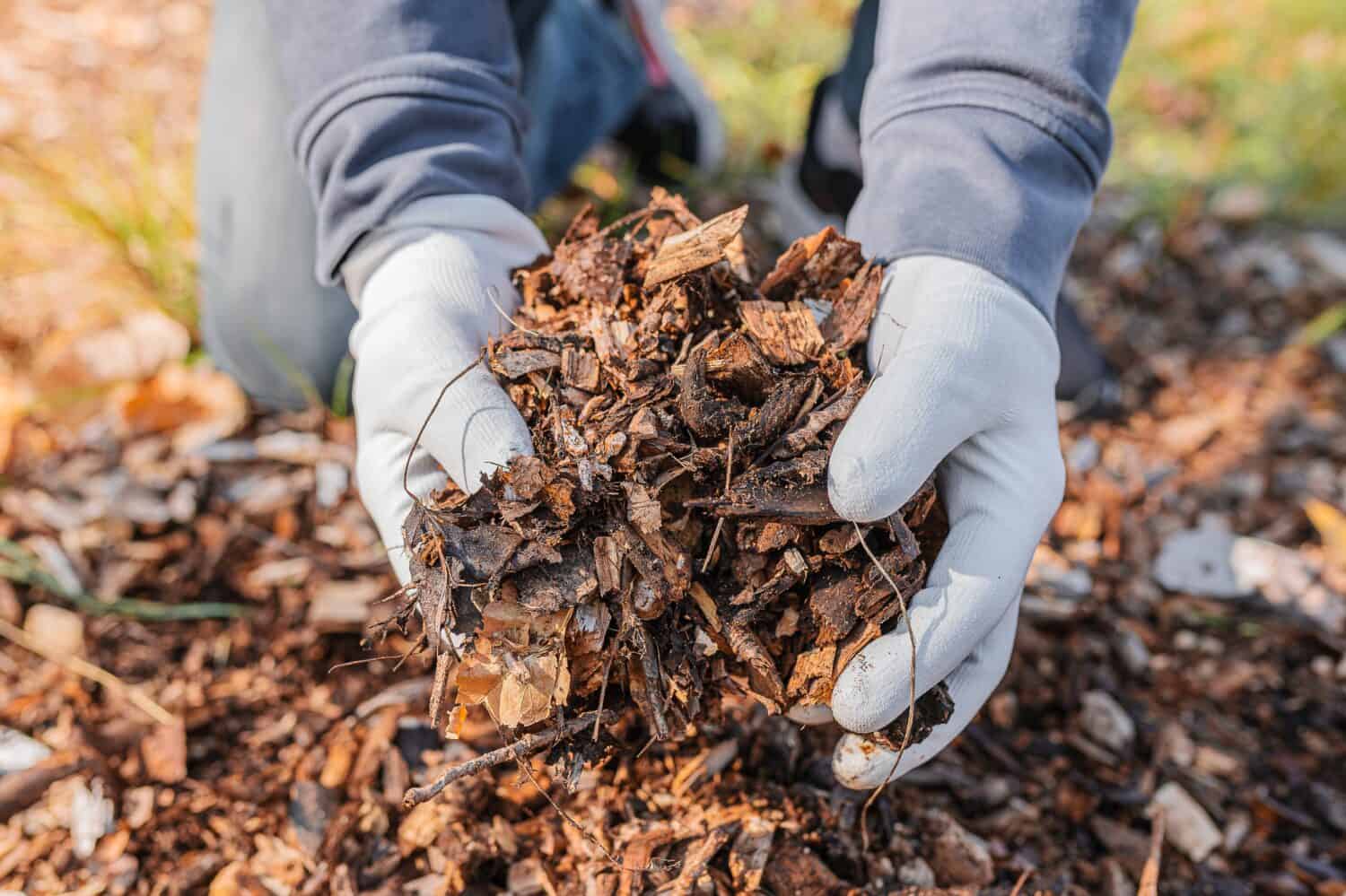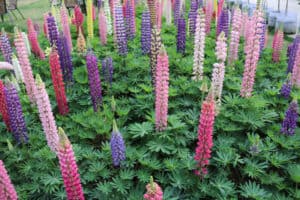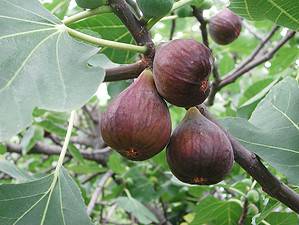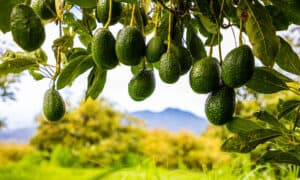Landscaping transforms your outdoor space into a sanctuary that is both beautiful and functional. An essential component of great landscaping is your ground cover — a choice that often boils down to mulch vs. rocks. Both options present benefits and drawbacks. Discover which is best for your yard based on your yard’s needs and your preferences.
Benefits of Mulch
Mulch offers a suite of benefits that contribute to the health and beauty of your yard. There are two main types of mulch: organic and inorganic.
Organic mulch contains natural materials that decompose over time, providing a range of soil benefits. On the other hand, inorganic mulch offers longevity, durability, and erosion control.

Mulch improves soil health and protects plants from cold shock.
©OzCameraman/Shutterstock.com
Moisture Retention
Mulch creates a protective layer over the ground, significantly reducing the rate of evaporation and increasing moisture retention. It helps your plants maintain their moisture levels, decreasing your watering frequency. This is especially important in the hot summer months and drought-prone areas where water conservation is essential.
Weed Suppression
Mulch provides a physical barrier in your garden beds that prevents sunlight from reaching weed seeds. The reduced sunlight exposure slows weed germination, cutting down on your landscape maintenance needs.
Improved Soil Health
Organic mulch, like wood chips, bark, or straw, acts as a natural fertilizer for your landscape plants and soil. As the mulch breaks down, it contributes valuable nutrients such as nitrogen, phosphorus, and potassium to your soil. The gradual decomposition improves your soil’s structure and enhances its water capacity and airflow.
Soil Temperature Regulation
Mulch provides an insulating layer for your plants’ root systems. It shields them from extreme temperatures, keeping the soil more stable. Mulch keeps roots warm in the winter and fall seasons while providing a cool, moist layer in the hot summer months.
Aesthetic Appeal
Beyond its practical benefits, mulch also contributes to the visual appeal of your yard. It comes in many colors and textures, including browns and reds. Create contrast or accents with different shades of mulch, or lay mulch to match the exterior of your home.
Drawbacks of Mulch
Mulch offers many nutritional benefits for your yard and landscape plants, but it is not without its drawbacks — most notably its need for periodic replacement.
Replacement
Organic mulch is not a permanent landscaping solution. Its decomposition provides beneficial soil nutrition, but you will need to replace your mulch annually to maintain its effectiveness and coverage. You can expect to spend around $3 to $5 per 2-cubic-foot bag.
Pest Attraction
Organic mulch attracts insects and other pests. The moist environment becomes a breeding ground for termites, ants, and beetles while also providing rodents with a comfortable place to hide, nest, and forage.
Mulch requires regular maintenance to maintain proper heights and mitigate pest issues. Experts recommend aiming for a depth between 2 and 4 inches, ensuring that you keep mulch away from structures and foundations.
Maintenance
Mulch cuts down on the time you will spend weeding your landscape, but it also requires maintenance of its own. Annual replacement and regular raking are necessary to ensure your mulch layers remain even. Compaction reduces vital airflow to your landscape plant’s root systems, trapping moisture and encouraging fungal growth.
Benefits of Rocks
Rocks contribute to both the aesthetic and functional aspects of your yard, and one of the largest advantages is their durability.
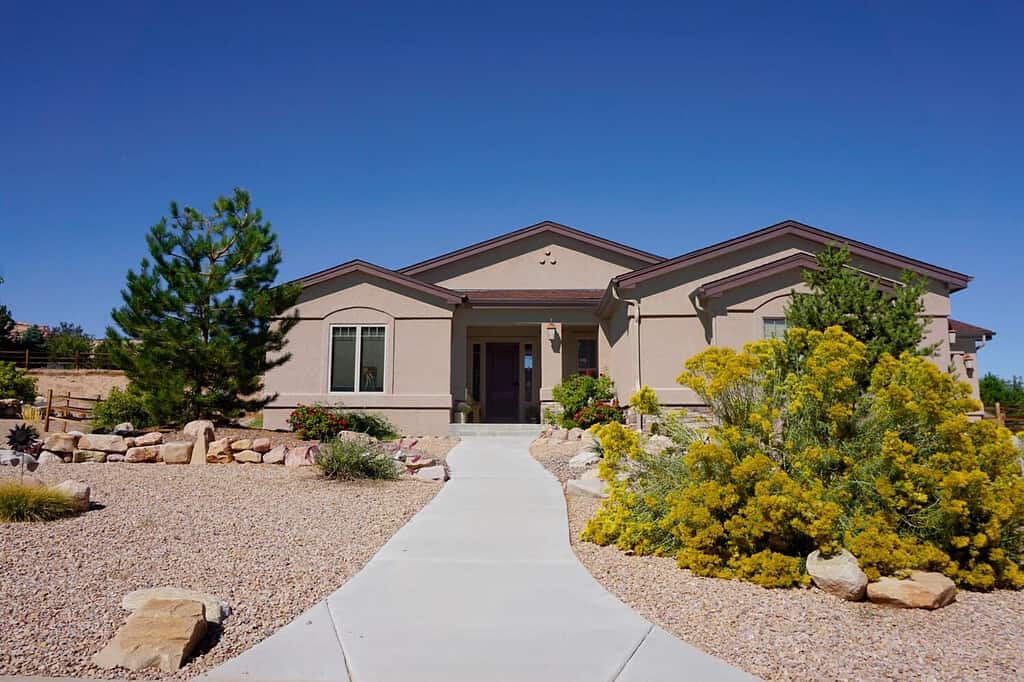
Many landscaping stones come from rivers, lakes, and beaches all over the world.
©PT Hamilton/Shutterstock.com
Longevity
Unlike organic materials that break down and require replacement, rocks maintain their integrity and offer a long-lasting ground cover solution. The durability of rocks translates to cost savings and reduced maintenance efforts.
Weed Control
Like mulch, rocks suppress weed growth and lower your maintenance needs when used with a weed barrier. Clear existing weeds before laying down your rocks, and regularly inspect your rocked areas for emerging weeds. Remove specimens by hand or spray them with a post-emergent herbicide.
Erosion Prevention
Many regions experience heavy rainfall or soil erosion, and rocks can serve as effective erosion control. They anchor the soil in place and reduce harmful runoff.
Rocks are heavy and stable. Placing rocks on slopes and vulnerable areas helps hold the soil in place. They create a barrier that slows down water. Rocks reduce runoff and erosion and protect plant roots.
Heat Retention
Rocks absorb and retain heat. This is beneficial for plants that thrive in warm environments, and your rocks can serve as a heat reservoir during cooler periods, a phenomenon known as thermal inertia.
Thermal inertia causes a warmer microclimate around your rocks compared to the surrounding areas of your yard. Larger rocks retain heat more effectively than small stones like pea gravel.
Modern Aesthetics
Rocks offer more modernity than traditional mulch. They have clean lines and defined edges that complement contemporary architecture and landscapes.
Drawbacks of Rocks
Rocks offer durability and a modern appeal, but they do not enrich the soil.
Heat Intensity
Heat retention is beneficial to some plants but harmful to others. The heat that your rocks absorb leads to higher soil temperatures, which can stress plants that prefer cooler conditions. Heat-stressed plants experience wilting, leaf scorch, and reduced growth.
Limited Soil Enrichment
Rocks do not break down like organic mulch, so your soil does not receive added benefits. You will need to supplement your soil with fertilization for healthy landscape plants. Counterbalance the effects of landscape rocks by incorporating compost into the soil before laying your rocks.
Expensive
Rocks offer serious longevity, lasting between 8 to 10 years before your landscape needs a top dressing, but their durability comes at a high cost. The upfront cost of landscape rocks is significantly higher than mulch. However, the long-term benefits offset the high upfront cost for many homeowners.
How to Choose Between Rocks and Mulch for Your Yard
When deciding whether to use mulch or rocks for your yard, consider the following:
- Climate: Your climate affects how each option performs. Consider factors like average rainfall, temperature fluctuations, and humidity levels.
- Plants: Plants are one of the biggest influencing factors. Heat-loving plants thrive in the warmth kept by rocks, while moisture-sensitive species flourish in mulch.
- Maintenance: Consider the level of maintenance you want to commit to. Mulch requires periodic replacement and upkeep, while rocks are more low-maintenance.
- Aesthetics: Your style and the aesthetics of your yard affect your choice. Mulch offers a softer, more natural appearance, and rocks lend a modern charm.
The choice between mulch and rocks depends on your needs and preferences. Each option brings advantages and disadvantages, creating a dynamic palette for crafting your outdoor space. Aim to balance nurturing your plants, curbing weeds, preventing erosion, and expressing your artistic vision.
FAQ About Mulch vs. Rocks
How Do I Prevent Pests in My Mulch?
Regular maintenance and inspection are the best defense against mulch-related pests. Follow these steps to help deter the pesky invaders:
- Choose the right mulch: Cedar mulch repels insects like ants and termites.
- Maintain proper depth: Aim for a layer that is 2 to 4 inches high.
- Keep mulch away from structures: Lay mulch 2 to 3 inches away from foundations and structures.
- Clear debris: Remove fruits, leaves, and twigs as soon as possible.
- Replace mulch annually: Old mulch is more attractive to pests.
- Avoid overwatering: Excess moisture attracts pests.
- Inspect your landscape regularly: Watch for signs of insect activity, including tunnels, nests, and plant damage.
Do Rocks Attract Pests Like Mulch?
No. Rocks do not attract pests. However, they create hiding spots for pests already present in your yard, and rocks shelter ants, spiders, beetles, and more.
Can I Use a Combination of Rocks and Mulch?
Yes. Many homeowners use rocks for pathways, borders, and other decorative elements while using mulch for garden beds because of its moisture retention and soil-improvement qualities.
Thank you for reading! Have some feedback for us? Contact the AZ Animals editorial team.

